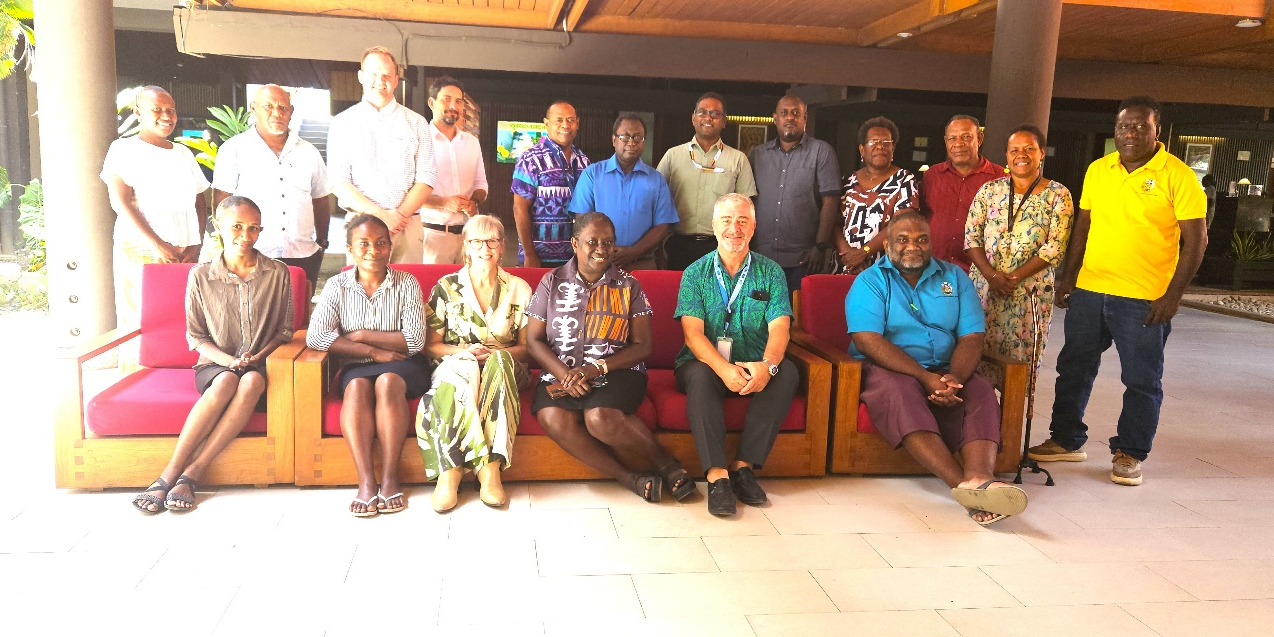The Ministry of Health and Medical Services (MHMS) with support from the World Health Organization (WHO) yesterday successfully held a workshop on International Health Regulations (IHR) and Public Health Law in Solomon Islands, which aimed to modernize legal frameworks that protect the health and security of Solomon Islanders.
Attending the workshop are Ms. Pauline McNeil, the Health Permanent Secretary (PS), MHMS Senior Executive Management Team, Heads of Departments, a representative from the Attorney General’s office, and WHO officers.
Ms. McNeil, in her remarks, welcomed all the participants and said the Ministry of Health is currently working through several legislation reviews and reform processes for laws under the Ministry’s administrative responsibility.
She added these response priorities are aligned to the National Health Strategic Plan 2022-2031 while also being aware of regional and global activity in implementing health security, and the entry into force of the newly amended International Health Regulations.
She further explained the Ministry’s current legal framework for public health is a regulation under the Environmental Health Act. The law itself is drafted in a style more familiar to British people in the 1930’s to 1950’s than Solomon Islanders in 2025 looking for a law to support modern public health practices over the next decade or more. It uses terms like “nuisance”, “offensive trade”, “cesspool soak away” and “effluvia”.
“Not terms commonly used anywhere in our country. The thinking about public health which informs the law is equally old, outdated and efficient. Diseases considered worthy of notification have changed, as have diagnostic processes, data collection and responses to public health risk.
“Legislative approaches have also shifted to restrain uses of power to ensure they are proportionate, the least restrictive available and as respectful of individual freedoms as possible,” said PS McNeil.
She encouraged participants to contribute and help begin the process of replacing a 55-year-old law with a modern law which meets the needs and designed for the Solomon Islands context and may be successfully and sustainably implemented.
“The regulation is drawn almost entirely from a replaced 1970 Public Health Act, making it 55 years old. It predates of HIV, avian flu, SARS and COVID. It is transforming events and modern thinking in public health, advances in science, significant population growth, globalization and increasing complexities in health systems in the past 55 years”, explained PS McNeil.
Therefore, she strongly emphasized that public health is everybody’s business and encouraged participants to think about the multisectoral implications of responding to public health risks and need for alignment in our laws and in our practice.
“None of this is easy. We face resource constraints and a shifting and uncertain global and regional environment. We recognize that responding to public health risks and public health emergencies is a part of life and we know we need to prepare for the next one without knowing what it will look like or how it will spread.
“Today we have a valuable opportunity to discuss, as a group, how some of these challenges might be met, while acknowledging both the strengths and limitations of our functions and mandates. Whatever your role, your willingness to come today and to join us in thinking about a modern legal framework for public health practice in the Solomon Islands, is much appreciated and you are warmly welcome”, said PS McNeil.
Mr. Georgios Theocharopoulos, WHO Technical Officer for Epidemiology speaking on behalf of WHO Representative in Solomon Islands Dr Howard Sobel, stated that this workshop represents a critical step in acting on the recommendations from the Joint External Evaluation completed just last year.
He said legal mapping may sound like a technical exercise, but its importance for implementing the International Health Regulations cannot be overstated.
“Let me offer a practical example: when an outbreak is detected, public health authorities need clear legal authority to act quickly, to have the right to collect samples, the authority to share information across borders, to restrict movement if necessary, and coordinate with, and lead other sectors. Without clear laws, or with outdated laws containing conflicting provisions, response efforts become delayed, confused, or legally challenged at the very moment when speed and clarity matter the most”, said Mr. Theocharopoulos.
“Today’s work in mapping existing legislation, identifying gaps, and planning reforms is foundational to ensuring that when the next health threat emerges the Solomon Islands has the legal architecture to respond in ways that protect both public health and individual rights”, said Mr. Theocharopoulos.
Meanwhile, he further stated WHO is privileged to work with MHMS in this process, through participants’ collaborative spirit, bringing together health, legal, and multisectoral expertise, which reflects the very approach needed for effective health security.
The work and process is evolving and will involve key partner Ministries and other stakeholders.
– MHMS









